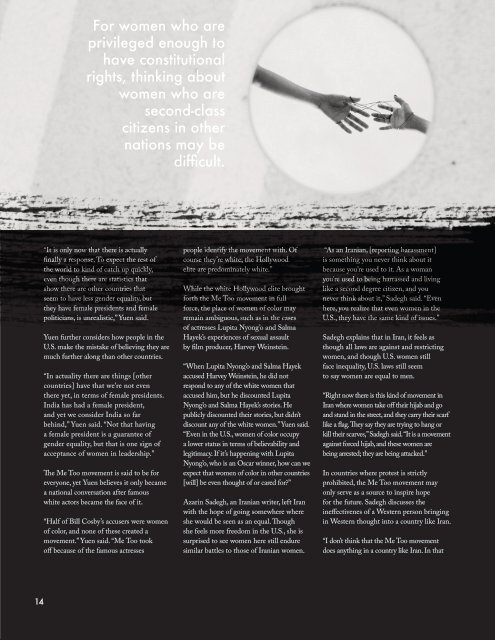The Point: Spring 2018
Spring 2018 | Volume 13 | Issue 2
Spring 2018 | Volume 13 | Issue 2
- No tags were found...
Create successful ePaper yourself
Turn your PDF publications into a flip-book with our unique Google optimized e-Paper software.
For women who are<br />
privileged enough to<br />
have constitutional<br />
rights, thinking about<br />
women who are<br />
second-class<br />
citizens in other<br />
nations may be<br />
difficult.<br />
“It is only now that there is actually<br />
finally a response. To expect the rest of<br />
the world to kind of catch up quickly,<br />
even though there are statistics that<br />
show there are other countries that<br />
seem to have less gender equality, but<br />
they have female presidents and female<br />
politicians, is unrealistic,” Yuen said.<br />
Yuen further considers how people in the<br />
U.S. make the mistake of believing they are<br />
much further along than other countries.<br />
“In actuality there are things [other<br />
countries] have that we’re not even<br />
there yet, in terms of female presidents.<br />
India has had a female president,<br />
and yet we consider India so far<br />
behind,” Yuen said. “Not that having<br />
a female president is a guarantee of<br />
gender equality, but that is one sign of<br />
acceptance of women in leadership.”<br />
<strong>The</strong> Me Too movement is said to be for<br />
everyone, yet Yuen believes it only became<br />
a national conversation after famous<br />
white actors became the face of it.<br />
“Half of Bill Cosby’s accusers were women<br />
of color, and none of these created a<br />
movement.” Yuen said. “Me Too took<br />
off because of the famous actresses<br />
people identify the movement with. Of<br />
course they’re white; the Hollywood<br />
elite are predominately white.”<br />
While the white Hollywood elite brought<br />
forth the Me Too movement in full<br />
force, the place of women of color may<br />
remain ambiguous, such as in the cases<br />
of actresses Lupita Nyong’o and Salma<br />
Hayek’s experiences of sexual assault<br />
by film producer, Harvey Weinstein.<br />
“When Lupita Nyong’o and Salma Hayek<br />
accused Harvey Weinstein, he did not<br />
respond to any of the white women that<br />
accused him, but he discounted Lupita<br />
Nyong’o and Salma Hayek’s stories. He<br />
publicly discounted their stories, but didn’t<br />
discount any of the white women.” Yuen said.<br />
“Even in the U.S., women of color occupy<br />
a lower status in terms of believability and<br />
legitimacy. If it’s happening with Lupita<br />
Nyong’o, who is an Oscar winner, how can we<br />
expect that women of color in other countries<br />
[will] be even thought of or cared for?”<br />
Azarin Sadegh, an Iranian writer, left Iran<br />
with the hope of going somewhere where<br />
she would be seen as an equal. Though<br />
she feels more freedom in the U.S., she is<br />
surprised to see women here still endure<br />
similar battles to those of Iranian women.<br />
“As an Iranian, [reporting harassment]<br />
is something you never think about it<br />
because you’re used to it. As a woman<br />
you’re used to being harrassed and living<br />
like a second degree citizen, and you<br />
never think about it,” Sadegh said. “Even<br />
here, you realize that even women in the<br />
U.S., they have the same kind of issues.”<br />
Sadegh explains that in Iran, it feels as<br />
though all laws are against and restricting<br />
women, and though U.S. women still<br />
face inequality, U.S. laws still seem<br />
to say women are equal to men.<br />
“Right now there is this kind of movement in<br />
Iran where women take off their hijab and go<br />
and stand in the street, and they carry their scarf<br />
like a flag. <strong>The</strong>y say they are trying to hang or<br />
kill their scarves,” Sadegh said. “It is a movement<br />
against forced hijab, and these women are<br />
being arrested; they are being attacked.”<br />
In countries where protest is strictly<br />
prohibited, the Me Too movement may<br />
only serve as a source to inspire hope<br />
for the future. Sadegh discusses the<br />
ineffectivenes of a Western person bringing<br />
in Western thought into a country like Iran.<br />
“I don’t think that the Me Too movement<br />
does anything in a country like Iran. In that<br />
14




